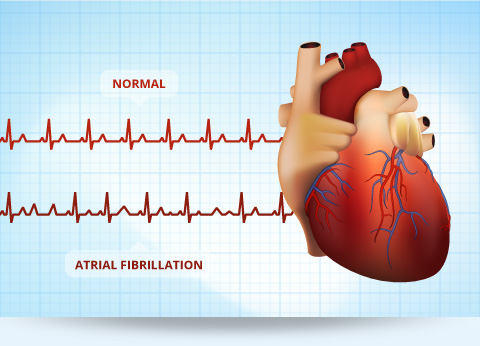- Home
- Editorial
- News
- Practice Guidelines
- Anesthesiology Guidelines
- Cancer Guidelines
- Cardiac Sciences Guidelines
- Critical Care Guidelines
- Dentistry Guidelines
- Dermatology Guidelines
- Diabetes and Endo Guidelines
- Diagnostics Guidelines
- ENT Guidelines
- Featured Practice Guidelines
- Gastroenterology Guidelines
- Geriatrics Guidelines
- Medicine Guidelines
- Nephrology Guidelines
- Neurosciences Guidelines
- Obs and Gynae Guidelines
- Ophthalmology Guidelines
- Orthopaedics Guidelines
- Paediatrics Guidelines
- Psychiatry Guidelines
- Pulmonology Guidelines
- Radiology Guidelines
- Surgery Guidelines
- Urology Guidelines
Blood thinning therapy not for female heart patients

Female atrial fibrillation patients are less likely than their male counterparts to receive blood thinning therapies to prevent stroke, say University of Cincinnati College of Medicine researchers.
Researchers noted the sex differences as they reviewed medical therapies for 1,585 patients whose doctors were testing a computerized decision support tool that uses patient information and characteristics to aid physicians and patients with decisions about anticoagulant therapy to prevent stroke in atrial fibrillation patients, explains Mark Eckman, MD, Posey Professor of Clinical Medicine and lead study investigator. Those enrolled in the trial were all patients in the UC Health primary care network.
The computerized model is known as the Atrial Fibrillation Decision Support Tool (AFDST) and is a decision analytic model integrated into UC Health's electronic health record. It pulls information about patients with atrial fibrillation and is able to calculate for the individual patient his or her risk of AF-related stroke and major bleeding while taking blood thinning therapy, says Eckman, a UC Health physician. Based on this information, the AFDST makes suggestions for the best treatment to prevent AF-related stroke.
Under treatment of patients with atrial fibrillation (AF) is a national problem and the AFDST is designed to get more Tristate AF patients using anticoagulants when appropriate, says Eckman, Director of the Division of General Internal Medicine at UC. The AFDST supports clinician decision-making by suggesting when blood thinning therapy is warranted. About 45 percent of women AF patients (326/725) were receiving potentially non-optimal treatment to prevent AF-related stroke (i.e., treatment that was different than that suggested by the AFDST), while only 39 percent of men with AF (338/860) were receiving discordant therapy, says Eckman.
"The irony is that women have a higher risk of AF-related stroke, controlling for other risk factors such as hypertension, diabetes, congestive heart failure, yet women are being under treated," said Eckman.
"There are some take home messages," says Eckman. "Doctors need to realize we have mental biases that women are healthier and at lower risk of stroke. It's the same story for coronary artery disease and risk of heart attacks. We think women are at lower risk and we ignore warning signs. Thus, when we are making decisions for blood thinning therapy for patients with atrial fibrillation, we need to remember that women are at higher risk and we need to make sure we treat them aggressively enough to prevent stroke."
Journal Reference:
- Mark H. Eckman, Gregory Y.H. Lip, Ruth E. Wise, Barbara Speer, Megan Sullivan, Nita Walker, Brett Kissela, Matthew L. Flaherty, Dawn Kleindorfer, Peter Baker, Robert Ireton, Dave Hoskins, Brett M. Harnett, Carlos Aguilar, Anthony Leonard, Lora Arduser, Dylan Steen, Alexandru Costea, John Kues. Using an Atrial Fibrillation Decision Support Tool for Thromboprophylaxis in Atrial Fibrillation: Effect of Sex and Age.Journal of the American Geriatrics Society, 2016; 64 (5): 1054 DOI:10.1111/jgs.14099
congestive heart failureCoronary artery diseasediabetesHypertensionMark EckmanThromboprophylaxisUniversity of Cincinnati College of Medicine
Source : University of Cincinnati College of MedicineNext Story
NO DATA FOUND

Disclaimer: This site is primarily intended for healthcare professionals. Any content/information on this website does not replace the advice of medical and/or health professionals and should not be construed as medical/diagnostic advice/endorsement or prescription. Use of this site is subject to our terms of use, privacy policy, advertisement policy. © 2020 Minerva Medical Treatment Pvt Ltd